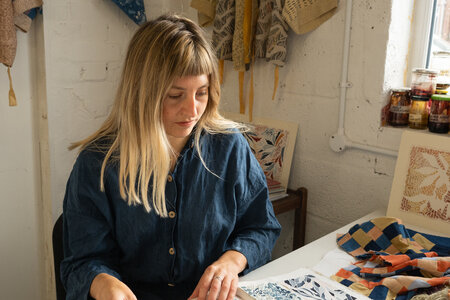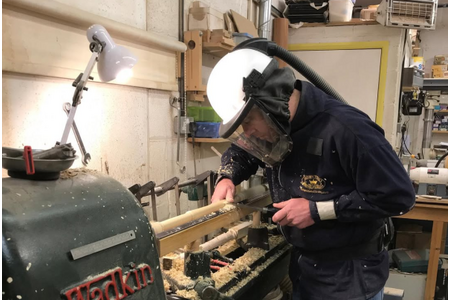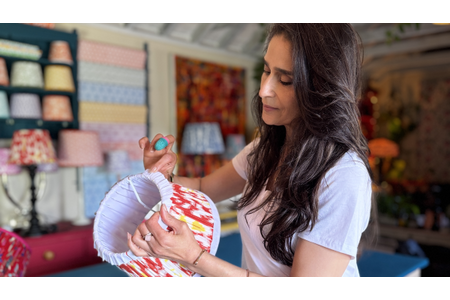'I met my future intern on a short course' - A conversation with jeweller Emily Bedford
On Thursday 11 July, just a quick walk from our new London campus in Bloomsbury, we sat down for a conversation with jeweller Emily Bedford at her Cockpit studio. In this broad discussion we talk about her craft, her experience of West Dean short courses and how she met her future intern in the hallowed workshops of West Dean.
What drew you to jewellery and silversmithing when you applied to London Met all those years ago?
Well, when I was 7 my mum bought some jewellery from Hamstead market and then became really good friends with the jeweller and she was an enameller. She didn't have a studio, she just had a little bench in the corner of her sitting room and she did torch firing enamels. When I was a kid I would say to her 'do you want any help?' She'd say no and I'd be a bit offended but looking back now I was her friend’s daughter who’d come to stay for the weekend but I wouldn’t want to play with my friend, I’d want to watch my mum's friend. I did a language degree and I've always danced a lot so I never really did anything with jewellery until I was about 25 years old. So I did my degree bur I always wanted to do jewellery and there was the Sir John Cass, as it was called then, so I did a tiny bit of enamelling there but it's very inaccessible unless you’re in a college with all the facilities. You could get a table mounted jig put on a kitchen table and do something with that but with enamelling you need a kiln, all the colours and all the equipment so I never really got to do it. But I did start making jewellery and then started selling jewellery.
When you started making those first pieces did you know you wanted that to be your career or were you making for the joy if it?
No, when I was a kid I was thought, ‘I'm going to be a jeweller and I'm going to be able to be self-employed and use my time as I want and then go for dance lessons. I did a degree in languages because that was what people did, to do a degree in jewellery would have been considered insane, no one had ever mentioned it. You don't do a degree in jewellery, you do a degree in something academic.
That first order that you got from a Japanese retailer. Did that change your outlook? A realisation that this is something you can do?
After my degree I was in London working and I was made redundant so I went to the job centre and said I don't want to sign on and not work, I want to set up a business so can you help me? So they gave me an extra 10 pounds and told me about this place in Clerkenwell and so I went and rented a little studio. We then did open studios and someone came round and ordered 50 pairs of gold earrings. I was leaping out of the bed in the morning thinking, ‘I’ve made it!’ - in reality I didn’t make any money from it, not one penny, because I had no idea what I was doing. I thought it would be like that every week, it’s never happened again (in that way)! That was just one woman from a department store in Japan.
Did you have anyone helping you or was it really a learn as you go situation?
There was a guy called Dominic Walmsley who is a very traditional jeweller who has a shop in Kent and he was looking at what I made and told me ‘I love it but it’s just not perfect enough.’ He became like a mentor, he would tell me my pieces weren’t identical enough because I was making everything by hand, I was very much a rookie, learning as I went, a lot of my early work wasn’t the best.
So how did you bridge that gap? Going from your early work to making pieces you and your mentor were happy with?
It was a gradual learning process over a year or 2. I then went into a shop called Jill Wing on Upper Street and then you could be in a shop on a sale or return basis and if they liked your work they’d take you and so I used to get regular sales and I could survive doing that. But now if you want to be sale or return, shop owners will check how many followers you have because they’re choosing between 2 jewellers and if one has 50,000 followers and one has 1000 they will take the jeweller with the bigger audience who will post about it. You have to be on social media, it’s just different.
How would you describe your style of jewellery?
I use the term modern mediaeval because I like historic looking jewellery and it’s quite unique. There’s no point in doing something that people have done before. I like that historic look but with a more sharp, crisp, contemporary exacting look. I enjoy making gender neutral rings and make a lot for same-sex couples getting married, married men quite like enamelled pieces as a wedding ring. People often compare my work to church windows or Tudor historic but with a less wobbly aesthetic. I use computer aided design to achieve a sharp look, so it looks old but actually it's really done with technology. The model is printed in wax and then that wax is made into a mould.
We're obviously here because of our West Dean connection, could you maybe talk a little bit about your relationship with West Dean? How it fits in with your career path and what it has done for you?
Well I’d only ever heard of it through my mother-in-law because her and her friends would go and talk about it. Then in 2022 I got a grant from the Goldsmiths Centre who are a charity that help jewellers so I chose West Dean as a place to spend some of the grant so I enrolled on a Jessica Turrell sifting enamelling short course. It was amazing. I know everyone says that about West Dean but there was something about the immersion in it, the fact you can stay there and the fact that you're in a little group and the rest of your life doesn't infiltrate. The teaching is amazing, you get lovely long days, you’re fed well and I learnt new things, I'd never looked at enamelling in the way that she teaches, it's very free. I learnt about sifting and not exacting. I didn't even know that was an enamelling process.
It's like a little sanctuary in the south downs isn't it? It’s a special place.
I just couldn’t believe it, I still keep thinking about the next thing I might do there, I'm always looking. I came back with my mind open.
I understand that it was on one these courses that you met your intern who will be starting with you in September?
Yes, I did the course with Jessica Turrell and that's where I met a girl in her 20s called Mary Chris. Mary who is 21 and in her final year of a degree and was getting really into enamelling and she was there thanks to the West Dean bursary just as I had attended thanks to a grant. With Mary I sensed a shared amazement and desire to get the most out of the course as opposed to ‘let's go for another break’. On the train home we were talking about our love of enamelling and I realised that it was going to be hard for Mary to practise this when she finished her degree. I also recognised I needed something to make me keep doing it so I asked her if she wanted to arrange days to come to my London studio to practise what we learnt and recreate the West Dean magic somehow. The danger is that you can become a course junkie, buy all the stuff and don’t ever use it. Doing the course is the easy part, keeping it up after is trickier.
So when did you formally float the idea of her joining you as an intern?
I kept thinking ‘I just want her as my intern cause she's perfect’ and then coincidentally when she finished her degree, Mary messaged me and asked if I ever needed an intern. She was thinking about learning jewellery techniques but I suggested that we do enamelling so that we don’t let what we learnt slide. Since Jessica’s course in October I’ve been making DIY enamelling tools with my partner like making sieves out of paint lids and mesh and bit by bit we’re adding to our enamelling resources for when Mary comes.
I think this process with Mary really speaks to the sense of community that is built on these short courses doesn’t it?
Yes, it was amazing. I mean, I’m old enough to be her mother but I just sensed her love of enamelling and I wanted to do it with her. So she's going to be starting in here with me in September 1 day a week. After I agreed to do that I felt - ‘flipping hell, I need to learn more!’ so then I applied to West Dean for a bursary to do another course in a different type of enamelling with Amanda Zoe. So now I've learnt that I'll come back and feed that into what I will show Mary because they're completely different things.
That's amazing. I love it.
It's so amazing, I’ve just started this whole new path with Mary Chris and having seen her final university pieces I think her time at West Dean has given her real confidence.
Mary is at the beginning of her jewellery making career. What barriers and difficulties did you face and what advice would you give to people like Mary and other makers starting out?
I would say just be patient. I think I've felt a lot of the time there's that gap between where you are and where you want to be and that can create stress. You can just read everything around you as if everyone's progressing and you're never going to catch-up. I would say to look at it more like gardening, you're just doing this thing and it's coming to fruition as you go and there's no, ‘I've got to do that’. You've only got today to do something and actually at West Dean that really cemented it for me because I went in and I was so precious about my time but Jessica is so laid back like ‘oh, we'll just do that and we'll try that’ . In my head I’m often worried about wasting time and materials or that I haven't made enough money to pay the rent and it's quite hard to release all that.
I imagine that can also inhibit the creative process?
Definitely, so I just say be patient. I think the sheer process of enamelling helps with that because you can't hurry it up. You just have to be patient. You don't have to be out there, succeeding and being seen to succeed all the time. There wasn't Instagram when I was starting out and I think that just doesn’t help. You can not have to succeed and not have to do well and not have to win awards. You can be quietly bringing your skills up because, in the end, you can spend 5 years, no one sees you, you could create something that’s incredible, but your ego's not had a pat on the back, that's the real work, you know?
I think that's so true. That's the pitfall of Instagram because everything is presented as overnight success.
That's so true, 'I just saw them yesterday and now they suddenly have a BAFTA.'
It's removing that, yeah. That's what's good about West Dean, the teachers are so generous and they don't have these big egos. I've been on courses where you can tell the teachers are being asked questions and maybe they don't want to give too much away, but then I think you're in the wrong job then.
But at West Dean I just feel they love the craft more than themselves doing the craft.
That's amazing to hear, that idea is so central to the West Dean 'Philosophy of Craft' from 1970. It's all about the importance of making, protecting heritage crafts and resisting these passive forms of entertainment.
Yeah it's so important, sometimes I'll be here thinking ‘shall I look on my phone?’ and then I just keep saying no, just go back into it. It's like a constant returning and the more you go in it, the more there is to keep you there, but it is resisting and there's a lot to resist now.
What do you see as your next step, whats the future for your jewellery making business?
I'd like to really focus on making some amazing enamel pieces and in the future I’d like to teach. I'll start off with Mary and try to get better, but I definitely want to teach young people who may be in temporary accommodation. I think there really is a barrier to doing enamelling and similar crafts for people of a certain education or background and they could be amazing at it. But I can show them the Goldsmith Centre and apprenticeships, they could be the most incredible artists but would never even know what enamelling even is. So I think the future is about getting better (my ego is still there), teaching and opening enamelling up to people like Mary Chris.
There's something quite empowering about wanting to continually learn and then at the same time trying to pass that knowledge on as well.
That is so true. I’ve been a jeweller for 25 years I've never wanted to teach and I think I'm only now getting to a point now where I realise you don't have to be the best of the best to teach, I don't have to be Jessica Turrell or Amanda Zoe, I still have a lot of experience and knowledge to share with a newer generation jewellers like Mary.


